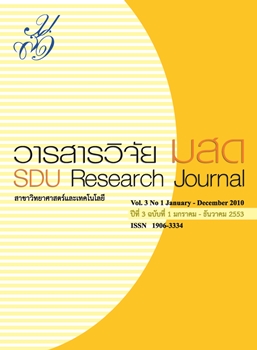การวิเคราะห์ตัวแปรจำแนกอาจารย์คณะวิทยาศาสตร์และเทคโนโลยี มหาวิทยาลัยราชภัฏสวนดุสิต ในโครงการส่งเสริมการจัดกิจกรรมการเรียนรู้ ที่เน้นผู้เรียนเป็นสำคัญ
Keywords:
การจัดกิจกรรมการเรียนรู้ที่เน้นผู้เรียนเป็นสำคัญ, เจตคติต่อการเรียนรู้ที่เน้นผู้เรียนเป็นสำคัญ, แรงจูงใจด้านผลลัพธ์ของการปฏิบัติงาน, แรงจูงใจด้านปัจจัยเกื้อกูล, การวิเคราะห์จำแนกประเภท, Learner-Centered Process, Attitude toward Learner-Centered, Motivation factors, Supportingfactors, DiscriminantAbstract
บทคัดย่อ
การวิจัยครั้งนี้ มีวัตถุประสงค์เพื่อ 1) วิเคราะห์ตัวแปรจำแนกกลุ่ม ระหว่างอาจารย์ที่ไม่เข้าร่วมโครงการส่งเสริมการจัดกิจกรรมการเรียนรู้ที่เน้นผู้เรียนเป็นสำคัญกับอาจารย์ที่เข้าร่วมโครงการฯ 2) ศึกษาอำนาจการพยากรณ์การเป็นสมาชิกกลุ่มของตัวแปรที่จำแนกกลุ่มที่ไม่เข้าโครงการส่งเสริมการจัดกิจกรรมการเรียนรู้ที่เน้นผู้เรียนเป็นสำคัญกับกลุ่มที่เข้าร่วมโครงการฯ ตัวอย่างคือ อาจารย์คณะวิทยาศาสตร์และเทคโนโลยี แบ่งเป็น 2 กลุ่ม คือ กลุ่มที่หนึ่งอาจารย์ที่ไม่เข้าร่วมโครงการส่งเสริมการจัดกิจกรรมการเรียนรู้ที่เน้นผู้เรียนเป็นสำคัญ จำนวน 39 คน และกลุ่มที่สองอาจารย์ที่เข้าร่วมโครงการฯ จำนวน 51 คน เก็บข้อมูลโดยใช้แบบสอบถาม และวิเคราะห์ข้อมูลด้วยค่าร้อยละ ค่าเฉลี่ยt-test และการวิเคราะห์จำแนกประเภท (Discriminant analysis) ผลการวิเคราะห์ข้อมูล มีดังนี้ 1. ตัวแปรที่สามารถจำแนกกลุ่มที่ไม่เข้าร่วมโครงการส่งเสริมการจัดกิจกรรมการเรียนรู้ที่เน้นผู้เรียนเป็นสำคัญ และกลุ่มที่เข้าร่วมโครงการฯประกอบด้วย 8 ตัวแปรย่อย คือ 1) การมีประสบการณ์ทำงาน 2) ผู้สอนสามารถพัฒนาผู้เรียน ได้ตรงตามศักยภาพ3) ความภูมิใจและพอใจในผลงานของตนเอง 4) การได้รับการยอมรับจากเพื่อนร่วมงาน 5) การได้รับการยอมรับจากหัวหน้างาน 6) การทำให้รายงาน SAR มีคะแนนสูงขึ้น 7) การมีทีมงานเป็นกัลยาณมิตร 8) องค์กรจัดหาทุนเพื่อพัฒนาสื่อและนวัตกรรม 2. สมการจำแนกกลุ่ม พยากรณ์การเป็นสมาชิกของกลุ่มที่ไม่เข้าร่วมโครงการส่งเสริมการจัดกิจกรรมการเรียนรู้ที่เน้นผู้เรียนเป็นสำคัญ ได้ ร้อยละ 82.10 และกลุ่มที่เข้าร่วมโครงการฯ ได้ ร้อยละ 86.30 สมการนี้สามารถพยากรณ์การเป็นสมาชิกของกลุ่มโดยเฉลี่ยได้ร้อยละ 84.40
คำสำคัญ : การจัดกิจกรรมการเรียนรู้ที่เน้นผู้เรียนเป็นสำคัญ; เจตคติต่อการเรียนรู้ที่เน้นผู้เรียนเป็นสำคัญ; แรงจูงใจด้านผลลัพธ์ของการปฏิบัติงาน; แรงจูงใจด้านปัจจัยเกื้อกูล; การวิเคราะห์จำแนกประเภท
Abstract
The purposes of this research were to (1) analyze discriminating variables of faculty members whoparticipated, and did not participate, in the Learner-Centered Activity Management Promotion Project; and(2) study the predictability for being group members of variables that discriminated those who did notparticipate in the Project from those who participated in the Project. The research sample consisted of90 faculty members of the Faculty of Science and Technology, Suan Dusit Rajabhat University, classified into39 faculty members who participated in the Project and 51 faculty members who did not participate in theProject. A questionnaire was employed as the data collecting instrument. Research data were analyzed with theuse of the percentage, mean, t-test, and discriminant analysis.
Research findings were as follows:
1. Eight variables that could discriminate faculty members into the group that participated, and thegroup that did not participate, in the Learner-Centered Activity Management Promotion Project were identifiedas follows: (1) work experience; (2) ability to develop learners according to their potential; (3) self-esteem;(4) acceptance by colleagues; (5) acceptance by superiors; (6) contribution to upgrading the scores of SARreports; (7) having good work team; and (8) fund acquisition organization for development of the media andinnovation.
2. The discriminating equation could predict members of the group that did not participate in theProject by 82.10 percent, and could predict members of the group that participated in the Project by 86.30percent. On the average, the equation could predict membership of the groups by 84.40 percent.
Keywords: Learner-Centered Process; Attitude toward Learner-Centered; Motivation factors; Supportingfactors; Discriminant analysis








